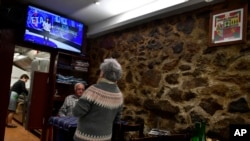Four former members of Basque separatist organization ETA were each sentenced Thursday in Spain to nearly 75 years in prison, more than 20 years after they attempted to murder two journalists and their infant son by placing a flowerpot filled with explosives outside the family’s home.
Aurora Intxausti, a journalist for El Pais newspaper; her husband, Juan Palomo, a reporter for Antena 3 television; and their then-18-month-old son, Inigo, were targeted in 2000 as ETA broadened its terror campaign across Basque society.
In previous years, the organization had targeted only police and soldiers but began killing and threatening journalists, judges, local politicians, women and children in a campaign it called the “socialization of suffering.”
In 2018, ETA announced its full and formal dissolution, but the Spanish judiciary is still pursuing members of the organization for past crimes.
The Spanish branch of watchdog Reporters Without Borders, or RSF, said attacks on journalists should be punished even if it takes judicial authorities two decades to catch up with the perpetrators.
“It is important that justice is done,” Alfonso Bauluz, president of RSF, told VOA.
“ETA represented a permanent threat to the freedom of expression, and its disappearance represents a strengthening of the freedom of the media and the security of Spanish journalists,” he said.
The bomb attack failed because as the family was leaving their home on November 10, 2000, Palomo heard something that sounded like a firecracker going off. He noticed a plant pot on the front doorstep that had not been there and told his family to get as far away from the door as possible.
The bomb contained 2.5 kilograms of dynamite and shrapnel. It failed to go off because Palomo opened the door briskly, causing the connection between the detonator and the explosives to fail.
Four ETA members admitted to attempted murder on Thursday in Madrid at the Audiencia Nacional, Spain’s top criminal court, and were sentenced to nearly 75 years each in prison.
Asier Garcia, Patxi Xabier Makazaga, Jon Zubiaurre and Imanol Miner received sentences of 19 years and 10 months for each of the three counts of attempted murder and a further 14 years and 10 months each for terrorist offenses.
In their closing remarks, the judges said the bomb had been planted “with the sole intention of causing the deaths of the couple and their child.”
Despite the sentences, under Spanish law, most criminals can serve a maximum of only 30 years in prison.
The case had been shelved through lack of evidence, but in 2020, police made a breakthrough when French authorities passed files on the case to the Spanish.
Intxausti said her family was forced to leave Basque country after the attempt on their lives, which left many other journalists fearing for their own lives.
Intxausti said the jailing of the four ETA bombers has given her family closure.
“It is proven that they went to kill without caring that my child was with us,” Intxausti told El Pais.
“It puts an end to a tragic event that occurred in 2000,” she said. “I have to thank the Civil Guard, who discovered who the people who wanted to kill us were, and to the court for issuing a fair sentence.”
ETA, which killed 858 people during its four-decade armed campaign, renounced its use of arms in 2011.
The organization also kidnapped 77 people, threatened 42,000 others and carried out 9,000 assaults, according to a 2013 study by the University of Seville. It said 326 journalists had been threatened by the separatist organization, according to data from the Spanish police.
Another report, by the Committee to Protect Journalists, from 2001 found ETA’s attacks on reporters threatened press freedom.
“Press freedom is generally respected in Spain, and the CPJ does not routinely monitor conditions in the country; however, a series of attacks on journalists by ETA, including the murder of a prominent columnist from El Mundo [newspaper] greatly alarmed journalists during 2000, forcing many to leave the Basque region and others to hire full-time bodyguards,” the report said.
“ETA is using the same kind of terror tactics used by [late Spanish dictator General Francisco] Franco,” it said.
In 2018, ETA issued an apology for its actions and accepted that it bore “direct responsibility” for years of bloodshed.




